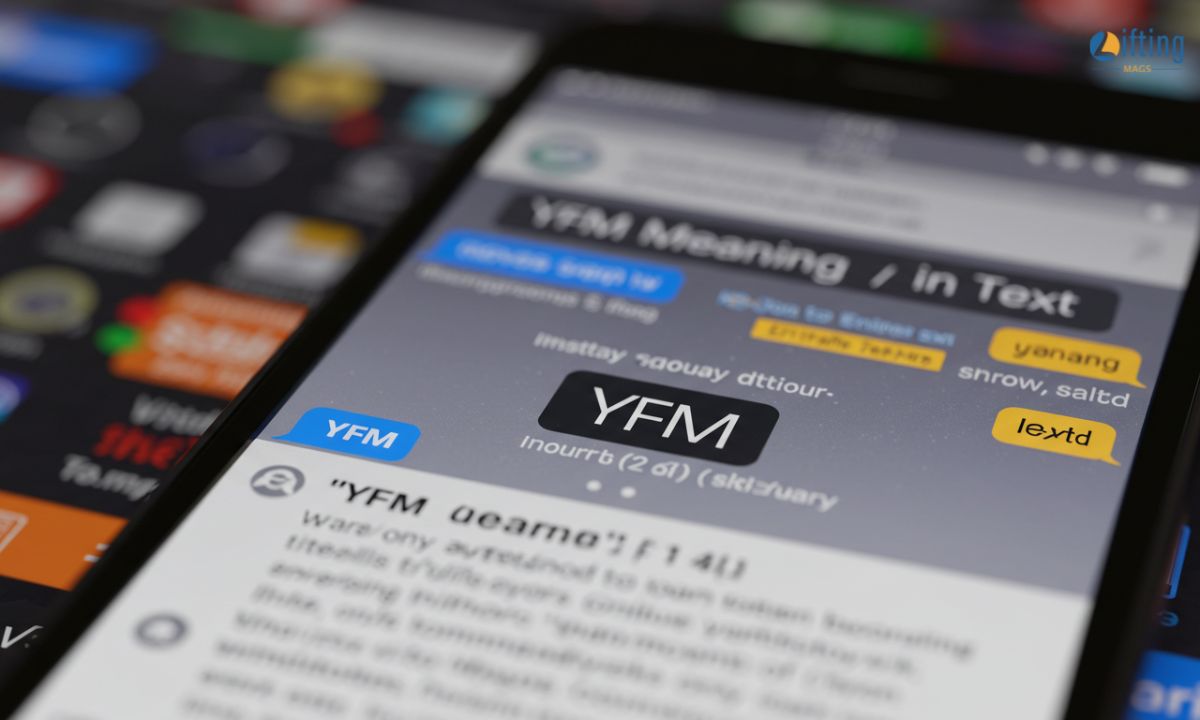Ever received a text that left you scratching your head in confusion? If you’ve encountered the acronym YFM and wondered what it means, you’re not alone. This slang term has gained traction in recent years, particularly among younger audiences in casual conversations, social media, and gaming communities. Understanding YFM can help you stay connected and avoid any awkward miscommunications. In this guide, we’ll explore the meaning of YFM, its history, usage, misconceptions, and more, so let’s dive in!
1. Definition & Meaning
What Does YFM Stand For?
At its core, YFM is an acronym for “You Feel Me?” This phrase serves as a casual way to ask if someone understands or relates to what you’re saying. It’s commonly used in informal settings, where the speaker is looking for agreement, empathy, or simply a way to connect with the listener.
Contextual Usage
YFM is often employed in conversations where emotions or personal experiences are being shared. For instance, if someone says, “I had a rough day at work, YFM?” they are essentially asking if the other person can relate to that feeling of frustration or exhaustion.
Emotional Connection
Using YFM can foster a sense of camaraderie. It’s a way of checking in with someone to ensure they are on the same page emotionally. This is particularly important in today’s fast-paced world, where quick communication can sometimes lack the depth of face-to-face conversations.
2. Background & History
Origins of YFM
The phrase “You Feel Me?” has its roots in African American Vernacular English (AAVE). It emerged as a means of building connections and checking for understanding, particularly within African American communities. By the 1990s, the phrase began to gain traction through hip-hop culture, where artists often used it to engage their listeners and create a sense of shared experience.
Cultural Influences
YFM’s popularity surged with the rise of texting and social media in the 2000s. As informal communication became more prevalent, YFM found its way into everyday language, particularly among younger demographics.
Data Point
According to a 2021 survey by the Pew Research Center, 95% of teens use social media, making platforms like Twitter and Instagram prime environments for slang like YFM to flourish. The ability to convey emotions quickly and effectively in text form has made acronyms and slang essential tools for communication.
3. Usage in Various Contexts
Texting
In text messaging, YFM serves as a quick way to seek affirmation or empathy. Here are a few examples:
- Friend 1: “This homework is killing me! YFM? 😩”
- Friend 2: “Totally, it’s way too much! 😅”
Social Media
On platforms like Twitter, YFM is often used to engage followers and spark conversations. For example:
- Post: “This rain is ruining my plans, YFM? ☔”
- Reply: “Ugh, it’s pouring here too! 😩”
Gaming
Gamers frequently use YFM to share experiences or frustrations. An example of this might be:
- Gamer 1: “That boss fight was brutal, YFM? 🎮”
- Gamer 2: “Yeah, I died like ten times! 😬”
Casual Conversations
In everyday dialogues, YFM helps build rapport. Here’s how it might look:
- Friend: “This party’s awesome, YFM? 🎉”
- You: “Yeah, it’s a blast! 😄”
4. Common Misconceptions & Clarifications
Myth vs. Fact
While YFM is widely used, several misconceptions can lead to confusion:
- Misconception: YFM is a random abbreviation with no clear meaning.
- Clarification: It specifically means “You Feel Me?” in most texting contexts.
- Misconception: YFM is appropriate for all audiences.
- Clarification: It’s very informal and may not be understood in formal or professional settings.
- Misconception: YFM always expects a serious response.
- Clarification: It’s often lighthearted, seeking casual agreement or empathy.
Importance of Context
Understanding the context in which YFM is used is crucial. Misusing it in a formal setting may lead to misunderstandings or even awkwardness.
5. Similar Terms & Alternatives
If YFM doesn’t resonate with your audience, consider these alternatives:
| Term | Meaning | Best Used In |
|---|---|---|
| YFM | You Feel Me? | Texting, gaming, casual chats |
| You get me? | Similar to YFM, less slangy | Casual conversations |
| Understand? | Formal way to check agreement | Broader contexts, professional |
| Relate? | Seeks emotional connection | Social media, personal chats |
6. How to Respond to This Term
Your reply to YFM can vary based on the tone of the conversation. Here are some examples:
Casual 😊
- Friend: “This show is so good, YFM? 📺”
- You: “Totally, I’m hooked! 😄”
Humorous 😂
- Friend: “I ate too much pizza, YFM? 🍕”
- You: “Oh yeah, my stomach’s screaming too! 😜”
Professional 💼
- Colleague: “This deadline’s tight, YFM? ⏰”
- You: “I understand, it’s a lot to handle.”
Neutral 🔒
- Friend: “This weather’s awful, YFM? 🌧️”
- You: “Yeah, it’s pretty rough out there.”
Tips for Engaging Conversations
- Match the Mood: Tailor your response based on the conversation’s tone.
- Encourage Openness: Use YFM as a springboard for deeper discussions.
7. Regional or Cultural Differences
Understanding Variations
YFM is primarily used in the U.S., but its reception varies in other English-speaking countries:
- United States 🇺🇸: YFM is rooted in AAVE and is common among younger people, especially in urban or pop culture contexts.
- Other English-Speaking Countries 🌍: While understood, it may sound very American or slang-heavy. It’s less common in places like the UK or Australia.
- Non-English Regions 🌐: Rarely used, as “You Feel Me?” doesn’t translate easily. Local slang like “Got it?” may be preferred.
Importance of Context
When communicating internationally, it’s wise to clarify the meaning of YFM to avoid confusion.
8. Comparison with Similar Terms
Here’s a closer look at how YFM stacks up against its alternatives:
| Term | Meaning | Key Difference |
|---|---|---|
| YFM | You Feel Me? | Informal, seeks emotional connection |
| You get me? | Similar, slightly less slangy | More neutral, less cultural |
| Understand? | Checks comprehension | Formal, widely understood |
| Relate? | Seeks shared feelings | More emotional, less questioning |
Unique Features of YFM
YFM stands out due to its casual nature and its ties to pop culture, making it particularly relatable among younger audiences.
9. Usage in Online Communities & Dating Apps
Engagement on Social Media
As mentioned previously, YFM is a popular term on social media platforms. Here are some examples:
- Twitter/X 🐦: Used to engage followers or share relatable moments.
- Example: “This Monday is dragging, YFM? 😴 #Relatable”
- Dating Apps 💘: Signals a casual, relatable vibe.
- Example: “Love music and chill vibes, YFM? 🎶”
Tips for Effective Use
- On dating apps: Respond to YFM with shared interests to keep the chat flowing.
- In gaming: Use YFM to connect over challenges, but clarify if needed.
10. Hidden or Offensive Meanings
Clarifying Misunderstandings
YFM, in general, is not offensive. However, its informal nature might not resonate with everyone:
- No Offensive Meanings ✅: It’s a friendly way to seek connection.
- Context Matters: Using YFM in a serious discussion could seem dismissive.
Potential Issues
- Its informality might seem out of place in formal settings or with unfamiliar audiences.
11. Suitability for Professional Communication
Professional Contexts
YFM is generally not suitable for formal settings because it could confuse colleagues or seem unprofessional. Here’s why:
- Too Casual 📝: It may not be taken seriously in professional conversations.
- Cultural Gap: Non-native speakers or older audiences might not understand it.
Alternatives for Formal Settings
When in doubt, opt for clearer, more professional phrases:
- Instead of “YFM?”, say “Do you understand?” or “Are we aligned?”
- Instead of “This project’s tough, YFM?”, say “This project is challenging, do you agree?”
12. FAQs
What does YFM mean in texting? 🤔
It stands for “You Feel Me?”, asking if someone relates or understands.
When should I use YFM? 🧐
Use it in casual chats with friends, gamers, or online communities.
Is YFM okay for work emails? 📧
No, it’s too informal. Use “Do you understand?” instead.
Can YFM offend anyone? 😳
It’s not offensive, but it might confuse people unfamiliar with slang.
How do I reply to YFM? 💬
Try casual (“Totally!”), humorous (“Oh, I feel you!”), or neutral (“I understand”).
Is YFM used worldwide? 🌍
It’s most common in the U.S., less so elsewhere due to its slang roots.
Does YFM appear on dating apps? 💕
Yes, to show a fun, relatable vibe. Reply with shared interests to connect.
Conclusion
In conclusion, YFM, meaning “You Feel Me?”, is a fun and casual way to connect in texts, social media, and gaming. Rooted in pop culture, it builds rapport by checking if someone relates to your vibe. This guide has covered its meaning, history, and usage, along with tips to respond confidently. Whether you’re chatting with friends or bonding online, YFM adds a relatable spark to your conversations.
Next time you see YFM, remember it’s all about sharing the moment! Use it wisely, and you’ll fit right in with the conversation. 🌟😊

